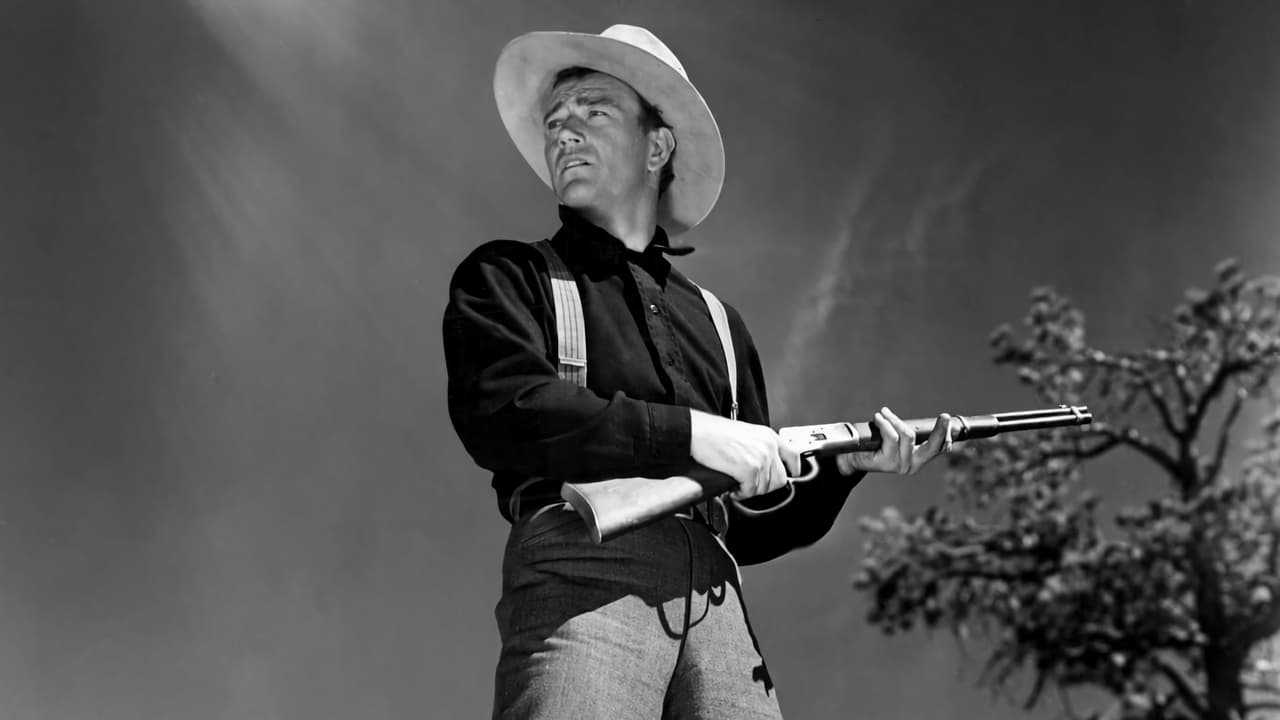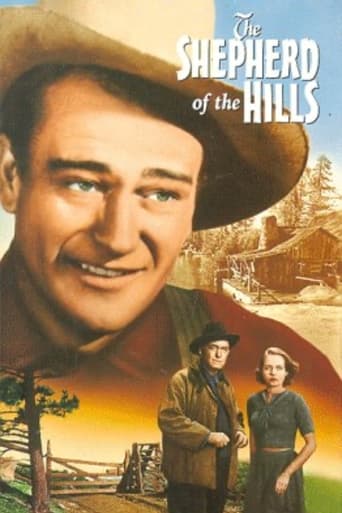

If you combined The Quiet Man with Sergeant York, you'd mostly have The Shepherd of the Hills. But in this case the end result is far weaker than constituent parts. The setting, characters, grudges, romance and violence is all very similar to that in the first half of Sergeant York. There are two aspects of this movie that should be recognizable to any fan of The Quiet Man. The first being the name of the piece land that the wealthy stranger buys to the chagrin of fearsome locals. In The Quiet Man, it's "White O'Morn". In this movie it's "Mourning Meadow". The other is the way John Wayne says "Thanks" for unhelpful input form well meaning outsiders when he's in a big fight. Incidentally, Ward Bond who plays a supporting role in The Shepherd of the Hills was in both The Quiet Man and Sergeant York.Clearly a lot of money was spent to make this movie. Technicolor in 1941 was itself a budget buster. The cast is amazing. I don't think there's another movie that includes Margorie Mane and Beulah Bondi. There are some very wonderful moments where it all comes together. But overall, it's a disappointment. The story is choppy and the ending is just hokey.
... View MoreIt's rare to come across a cult movie that I can not only unreservedly recommend but that I feel fully justifies its cult reputation. Of course, maybe the cultists like the movie for the wrong reasons. But with The Shepherd of the Hills it's hard to find wrong reasons. Everything about the picture is so right. The luminous performances: Wayne, perfectly cast, giving one of the best of his entire career; Carey, so winning and sympathetic, making the title role so memorable it will become a point of reference for the rest of your life; Marjorie Main, equally unforgettable as the blind woman who sees too much too quickly; Beulah Bondi, never more embittered or meaner-spirited as the real head of the Matthews clan; Marc Lawrence, giving the finest and certainly the most unusual study he ever attempted as the pathetically inarticulate Pete. So many others - Ward Bond who has the realistic fight with Wayne, Fuzzy Knight as the singer, Olin Howland as the squirrelling storekeeper... And all brilliantly directed by Henry Hathaway too. Henry, as I've said before, is the sort of director I most admire. For a start, he doesn't direct actors. He expects them to know their craft and is equally impatient with amateurs and hams. Secondly he's a specialist in action and outdoors work. He once said that he always preferred location assignments because it took him well away from front office interference. Hathaway ran a tight unit, turning out the movies he wanted to make in the way he wanted to make them. He had an eye for natural scenery, and could see its dramatic and story possibilities. Weeping Meadow is just that. The hill country in Shepherd is both brutal and supremely picturesque. Of course it's the script's large array of bizarre, vividly realized characters, plus the unusual setting in which they move, and the age-old conflicts which they generate (particularly Youth against Age, Idealism against tainted or even repented Experience, Freedom and/or Libertarianism against Authority) which has propelled The Shepherd of the Hills into such firm favoritism with present-day cultists. The movie of course has these qualities. But it has something else which is not so popular to-day and which indeed, both when the novel was written back in 1907 and throughout its various film versions, was the main reason for its existence. It has a spirituality, a supernatural element, a discussion of the Two Ways, a depiction of the classic struggle between good and evil, and the power of Light to overcome Darkness.
... View MoreBeneath the somewhat awkward narrative lies an affecting spiritual parable, about hate and redemption. The hatred Matt (Wayne) and his aunt Mollie (Bondi) have towards Matt's dead father is poisoning their lives and those lives around them. Never mind that they don't know the details surrounding the father's absence while Matt's mother and Mollie's sister dies alone and unattended. Now Matt has sworn a blood oath to kill his father whom he's surprisingly never seen, having been adopted instead into Mollie's family. Meanwhile, Mollie spews venom around her household that's affected her husband and everyone else.Then, into this backwoods den arrives a mysterious stranger Howitt (Carey) with a load of money and city ways. He doesn't preach any kind of redeeming sermon. Instead, he selflessly ministers to the sick, puts moonshiners to work at a better wage, and buys Matt's now abandoned cabin site for an outlandish price. He's got "good man" written all over him. In short, he's a transformative figure to all but Mollie and Matt who persist in their poisonous grudge.It's easy to see Howitt as a religious symbol though the movie's spirituality is pretty much limited to revealing beams of sunlight from above. (Rather surprisingly, no mention is made of biblical religion among Ozark folks known for their literalist beliefs.) But, to me, the real spiritual symbol is the apparent simpleton, Pete (Lawrence), one of Mollie's sons. The story is that he was normal until a bolt of lightning struck him at the same time Matt's mother died. Now, I suspect the story and its timing suggest some kind of mysterious passage from dying mother to nephew Pete. It appears, however, to be a curse on Pete, since from then on he behaves like a grunting primitive, unable to speak coherently. But consider two things. It's Pete's fateful struggle with Mollie, his mother, that finally forces her to consider the error of her ways, something not even Howitt has been able to achieve. Second, is the movie's central scene, at least in my little book. That's the powerfully moving shot of Pete alone and wordlessly picking at motes amid a glowing beam of sunlight through a small window. The message seems clear. Pete alone is in contact with something more ethereal than the Ozarks and moonshine or even Howitt. Whatever that communion is must remain both symbolic and mysterious. I also expect it's no accident that the movie cast the darkly colored Mark Lawrence in the role since he looks nothing like the rest of Mollie's family. Now, I'm neither particularly religious nor spiritual. But I do appreciate this aspect of the film, which I believe is both intelligently and artistically implied.The movie itself is a photogenic marvel as others point out. The colors are so lush I hardly recognized the Big Bear locations, where as an LA resident, I used to hike. Moreover, I really like the way the movie refuses to glamorize the casting of Sammy, the ingénue. Betty Field is perfect for the part, with her average looks but uncommon liveliness. She injects real spark into the proceedings. Carey too is well chosen. With his easy smile and affable manner, he wins us over quickly, making his showdown in the meadow with Matt something of a shocker. Somehow, it's odd seeing Wayne without a cowboy hat and with his real hair. Still, he's fine in the part, showing why he's generally underrated as an actor. I guess my only complaint is with Bondi who spreads the bile on pretty thickly. Then again, maybe that's what it takes in a family with a bunch of strapping roughnecks.All in all, the movie's something of a sleeper, even though it never made it into Wayne's canon of classics, probably because Wayne is not the central character, despite the poster depiction. Too bad. Because both the story and the visuals deserve to be better known, inasmuch as the humane message remains as enduring now as it was then.
... View More**possible spoilers**Although it has John Wayne in the cast it is not really a western. It is more a study of the Ozarks and the people who live there. Although some scenes are filmed in the studio you do get a feeling of the landscape of the area and the kind of people it produces; sturdy, suspicious, superstitious, kindly, ignorant and wise. Much like any isolated community around the world. The film is surprisingly good. The acting is solid all round. John Wayne makes a good attempt at the Young Matt role, bringing out well the confusion and conflicts in his mind. Beulah Bondi is riveting as the bitter Aunt Mollie. Harry Carey is good as ever. Betty Field as Sammy Lane is excellent and it is her who holds the film together. It is through her eyes we mainly see things. She is also quite sexy in her tight jeans and short tops. Some of the scenes are exceptional; when Daniel Howitt is cashing a never seen before cheque, when Granny Becky has her eyes uncovered after an operation, when Young Matt talks about how love is so complicated, when Daniel Howitt takes possession of the old house in Moaning Meadow, when Aunt Mollie cremates her dead son and herself, when Pete the mute brother is discovered in a stream of light pouring through a window trying to catch dust motes. All directed without sentimentality but with real feeling.It is one of those films which did not promise much from the TV listings but actually delivers much more than one expects.
... View More